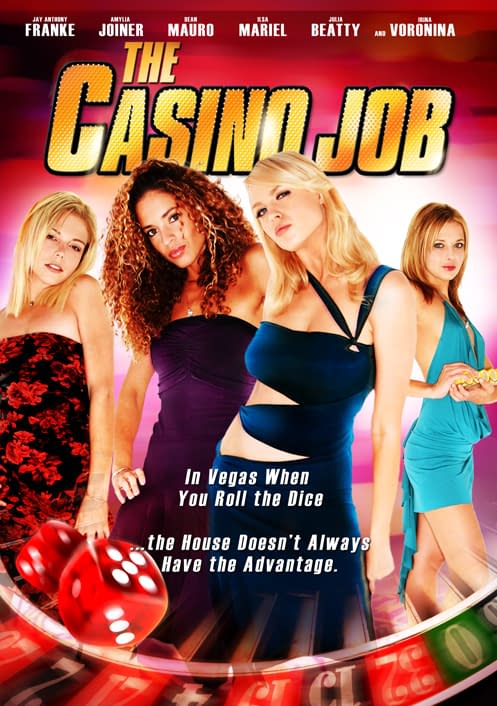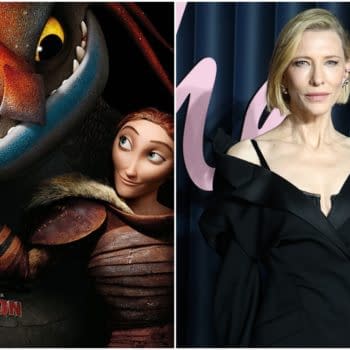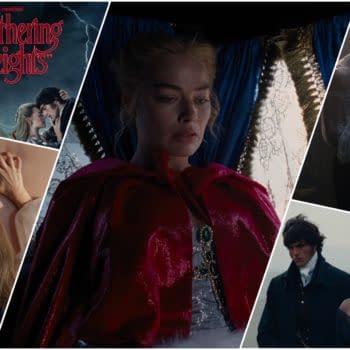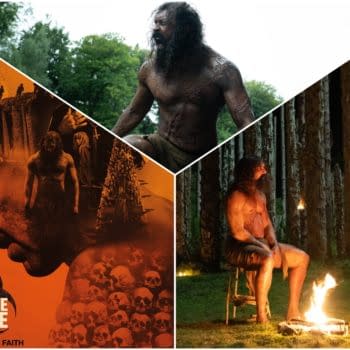Posted in: Movies | Tagged: Daryl Hannah, entertainment, film, indy filmmaking, Robin Hood Films, The Casino Job
Film Schooling: Insider Insights On Indy Filmmaking – Pre-production And Casting
By Chris Hood
(This is Part Eight of an ongoing series to help educate aspiring filmmaker on the process of making their first film. Previous articles in this series can be found at BleedingCool.com and MovieIndustry.com)
For new filmmakers, the idea of casting brings a sparkle to the eye (or make it a "twinkle" if you're Bryan Singer). This series of decisions will have an indelible impact on your show and a direct bearing on the success of the project. Know that picking the right talent is a bit of an art all by itself. And the reality is, in many cases, the most talented actor may not be the best choice. And the single best choice you can make is getting a recognizable name performer.

These train wrecks happen on a daily basis. I had a filmmaker recently tell me how excited he was about his project because he had Traci Lords (an 80's porn star) attached. He actually thought that was some kind of boon for his film. When he revealed she agreed to work on his movie for $5000 a week, I wanted to drive to his house and slap him across this face. This guy has no business making movies. Lords isn't worth more than any no-name actor he would cast (and might even bring a negative stigma to the project…but a GREAT wrap party!). As I often waste far more time than I probably should helping people, he called me back a few weeks later with his latest addition to the cast – James Franco! Oh, no wait, it was actually – James Franco's Mom. I'm not making this shit up. He was excited about this. He was excited about the fact that by casting the mom, he was also going to be able to feature a photograph of her son in the film. It just screams for top billing, doesn't it: "James Franco's Mom and a photograph of James Franco in 'Filmmaking Ignorance' opening…never, thank God!" Gladly, that film never came together so someone managed to avoid losing a chunk of money there.
Get a real name. Get a name commensurate to your budget. If you're spending $200k on your film, there are names you can get that will help with sales. It may not be an actor you're a fan of or even someone you particularly like. Tough shit. This is business (yes, I said it again and I'll keep saying it!). The worst thing I hear is when someone puts together a half million or a million dollars and their biggest star is someone like Martin Kove or Adrian Paul. Those are the kinds of actors you get for your $100k film because you can't afford anyone bigger. I know a guy who did a $1m film and the only "star" he had in it was Tori Spelling. If this had been during the peak of the Beverly Hills 90210 days, that wouldn't have been quite as tragic, but this was a full decade later. The film, as expected, was a complete loss for the investors.
There are so many of these stories, it could fill a book. Although the first impulse is to laugh at the ignorance, it's hard when you realize the passion and commitment that goes into this kind of endeavor and to know it's destined to fail before it's even begun. Yes, I do laugh at ignorance, but at the same time I sympathize when it's bred from passionate desire, no matter how misguided. In most cases these filmmakers get one shot and it only takes one fuck up destroy a life's dream (though they rarely make just one).
Another thing to keep in mind is that your "big star" doesn't have to be a lead. An effective trick I learned while working with Roger Corman is the value of supporting cast. He said to me once, "If a big star wants $10,000 a week, why shoot them for four weeks if you can do it in four days? You're still putting their name and picture on the poster just once!" Word, Roger!
Another good trick I learned is to pepper that supporting actor throughout the film so his or her role feels bigger. If he is killed off in the first 10 minutes, it feels like a smaller role. Instead, keep revisiting that character. If we see him five times throughout the film for two minutes each, he or she is more a part of the film and it feels like a more substantive role. Trade secrets, my friends…
Please keep in mind that casting is not about finding the best actor possible for a role. It's about finding the best actor possible for a role that meets the other necessary criteria. Steve Buscemi is an amazing actor, but there's a reason you don't see him headlining romantic comedies. Sure, he can act circles around most of the hack leading men in rom coms, but there are obviously other factors to consider in that formula. There may be a skill level you want, a look you want, a marketability you want and a budget range you want. Weigh the values of each of those.
At least mentally, you should have a checklist like this for what you want and need from every significant character. On the indy film level, you'll be making compromises. In some cases, a lot of them. And it comes down to choosing the compromises that make the most sense from a business perspective. Remember, the goal is to make money on this film so you can make another one and another one after that. If you're using your rich dad's money and he doesn't care if you blow it as long as you're happy with the film, have at it (or better yet, introduce me to your dad! Actually, why don't you introduce me to your mom, too? Oh wait, I already know her…well. Ouch! Burn!). It's imperative to keep in mind that the best actor available may not be the best decision for the project.
If you don't know the business, if you don't understand the business, you need to educate yourself quickly. Do the research. Call distributors. Many will give you advice on your project in hopes that you'll come back to them when it's done. They'll tell you Actor X sells well internationally or that Actor Y is overexposed and not as good or that Actor Z is good for this genre but not that one, etc. The Ulmer Scale and IMDB Starmeter ranks actors, though the latter can be off quite a bit, so best not to use as an exclusive resource.
Make sure you're not overpaying your talent. Yes, Jan-Michael Vincent was the highest paid TV actor in the world in the 80's. His work on Airwolf earned him $200,000 an episode. That show ended in 1987. By 1993 I was working with Vincent on a film with an entire budget less than $200k (and, no, he was not paid in cocaine – though it was on the craft service table). Keep in mind you're paying an actor based on his value today. Not last month, not last year and certainly not last decade. If you don't know that value, learn it.
Know that an agent or manager will give you a quote that is usually many times greater than what the actor will actually take. The reason for these ridiculous quotes? Dumb filmmakers. Most filmmakers don't know these quotes are almost always grossly inflated. They don't know they can negotiate or don't want to risk "offending" the agent or actor. I'll say it again – this is business! The agent wants you to be intimidated and in awe of his client's "power". The agent wants you to be excited about his client and not consider if the rate is reasonable. The agent wants you to be focusing on how to get the money to hire his client…not if his client is actually worth it to begin with. And every agent will tell you how his client is in "high demand" and you should book him right away as his "availability is limited". Yes, they're used car salesman (and Kim Kardashian has given more rides than a '87 Oldsmobile, so give those big tires a kick before shelling out the dough.)
I recently had a guy tell me he could get Daryl Hannah for $50k a week as a "favor" because the agent really liked the script. Dumb. Ass. The agent probably didn't even read the script and this guy was stupid enough to think that quote was a deal because he wanted to believe it. He wanted to think he was sitting on a gem with his project and this is a common delusion that newbies buy in to because it's so appealing. I wouldn't pay Hannah half of that, not today, not because I don't like her, but because her name just isn't worth it. There was a time she was worth $250k a week or more. She could land a huge movie next month and she could be getting that again a week later. Remember, John Travolta made $150k for Pulp Fiction and not longer after was making $20m a film. Travolta in 1993 wasn't worth $500k a film. In 1995, $5m would have been a bargain. You need to know these things when casting your line into the Hollywood talent (cess) pool.
Casting is always about the final product and the ability to sell it. If you'd rather have a great film that no one buys over a mediocre film that turns a nice profit, there's nothing I can teach you. Making the best film possible and making the most marketable film possible are often at odds. I'll give you an example that I experienced personally. I did a film called The Casino Job several years ago. It was my second film. My first was "Impact," which was my little art film opus which was a commercial flop. It took a lot of time and effort to get another project off the ground and I realized a bit late (by one film) one of the key pieces of information I'm trying very hard to impart in these articles, something successful indy filmmakers and Holly Madison already know – It's always about the money.
The Casino Job is about a Vegas casino owner who rapes a pretty, young stripper. When she doesn't get anywhere with the police, she and four of her friends (also strippers, of course), decide to rob the bad guy's casino. The motivation behind the story should be obvious – a bunch of hot chicks pull a casino heist. Sounds pretty marketable to me (and it was). As we were shooting on a micro budget (under $100k) and there was a decent amount of nudity and sex in the film, I knew casting would be problematic. The reality is – when you're trying to cast women for roles like this, usually something's got to give. I wanted women who were: a) beautiful, b) great actors, c) willing to work very cheap, and d) willing to take their clothes off. Guess what? VERY difficult to find that combination. I soon discovered, in most cases for those five leads, I was going to have to settle for 3 of the 4. Since C and D weren't negotiable, the trade-off was going to come down to looks vs. talent.
Now, much of the "auteur" was beaten out of me with the commercial failure of my first film on which I had reflected long and hard, and I had learned enough to know a very valuable truth of small films – the poster is half your movie. Now, posters are important for every movie, but more so with small films. In the studio world, name actors as well as marketing and promotional budgets sell films. In our world, it's the poster (or DVD cover). This is an immutable fact. As a distributor, I've sold movies based solely on the poster without the buyer ever watching the film. I've sold films in a space of five seconds by showing a poster to a foreign buyer and have him say right away, "I want it. I can sell that." Done. He didn't care if the acting was any good. He didn't care what kind of story was there. What he cared about was that the poster was good enough for people to shell out $5 to rent it or $15 to buy it because it had a cool monster or a fancy spaceship or a hot half-naked girl. He didn't care if the viewer liked it or not…the money was already spent. THAT is the reality of low budget filmmaking.
So when it came to casting my film, I knew given the choice between a stellar actress with average looks or a gorgeous lady with modest talent, that the latter would best benefit the film. Now, in a perfect world I would have had more money to pay beautiful, highly talented actresses across the board, but that wasn't the world I was living in. If that was the case, I would have probably made a different movie, anyway. Did the film suffer for that decision? Creatively, yes. Financially, absolutely not. We sold 100,000 DVDs in the first month because there were four beautiful, sexy girls on the box (the less attractive of the five was cut and not because she was the weakest actress!). I suppose we could have tried four average looking, great actresses on the box, but I would suspect far less impressive numbers.
So cast smart. Do your research. Negotiate. If you don't know something, ask. If you're not the right person for the job, find the right person. It should be a producer businessman calling the agents and managers, not the filmmaker. You can give yourself a major leg up even before the first camera rolls by handling this part of the process deftly and properly.
And for anyone currently in pre-production…I can get you James Franco's Mom for $5k a week and you should jump on that because she's about to blow up!
Chris Hood is a writer, producer and director of such films as "Counterpunch" starring Danny Trejo and "Dirty Dealing 3D" with Michael Madsen and C. Thomas Howell. He is also owner of Robin Hood Films, a Las Vegas-based distribution company representing English language films around the world and operates a film blog at MovieIndustry.com. He's also dead sexy. (Mr. Hood denies any involvement in the creation of this mini-bio.)

















